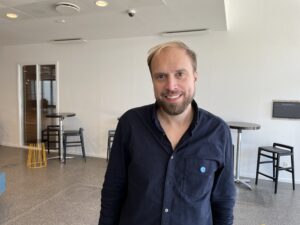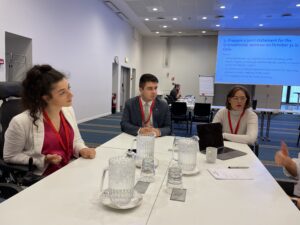Creating inclusive student councils with power – learning from the pandemic
Children & young people
23 Oct 2023
How can student councils be more influential during crises? And how can we make sure that they will be inclusive? Those were questions discussed at a workshop during the Nordic Youth Disability Summit in Copenhagen last week.
The Nordic expert group looking into the consequences of the Covid-19 pandemic and children’s right to have a say invited organisations for children and young people with disabilities to a workshop during the Nordic Youth Disability Summit in Copenhagen.
At the workshop Nordic youth and adult experts on participation worked on outlining recommendations on how student councils may become more influential, especially when advocating for or on behalf of children and youth in challenging life situations, with or without disabilities. The workshop was the first step in outlining a new report on promising practice, drawing on lessons from the Covid-19 pandemic.
Lessons to be learned from the Covid-19 pandemic
The Nordic Welfare Centre is in charge of an ongoing four-year long cooperation project looking into the consequences of the Covid-19 pandemic and children’s right to have a say, in accordance with Article 12 in the UN Convention on the rights of the child.
Teaching was completely or partially closed and moved online during the Covid-19 pandemic, and children and youths right to be heard and involved through student councils were seldom given priority.
The Nordic expert group is now looking for good examples of the opposite that we can draw important lessons from. They are collecting promising practise and gathering recommendations on policy, to spread in the Nordic region.
– During the pandemic, student councils were seldom regarded as an important organ of advocacy for students. In the workshop here, the youth organisations have given us important insights and recommendations on how student councils can become more influential, says senior adviser Merethe Løberg at the Nordic Welfare Centre.
Student councils in this context are councils for students from 12 to 25 years.
A body of influence and involvement in the school
Student councils are often the main collective body for consultation and influence that children and youth have in their educational institutions. At its best, a well-structured student council can give voice and influence to students’ concerns. The council may advocate on behalf of students with or without disabilities in challenging life situations.

For the school administrations, student councils can at its best be a body for co-operation between pupils and teachers, and an organ for evaluation and adjustments for the schools’ policies and practices. Student councils can aid and support the school administration’s efforts to ensure the wellbeing of all students and in creating an inclusive and positive learning environment for all.
– To make good decisions you need to have a youth perspective and listen to the students. During the pandemic, we could see that the student councils had less opportunities to make their voices heard. At the same time, authorities made decisions that affected young people in many ways, says Linus Wellander from The Swedish Agency for Youth and Civil Society, MUCF.
Many councils with limited influence
Today, the student councils in the schools does not necessarily grant students any actual influence. Many students feel they have little or no influence on their learning environment, even if there are student councils in place. Not all councils have enough influence to help the school and teachers in their efforts to ensure a safe and inclusive learning environment for all.
 Student councils should be inclusive, and students with disabilities need representation. Emilie Ghali, vice chairperson of the Danish association of Youth With Disabilities, SUMH, says that it should not only be the responsibility of the students to put together a diverse student council.
Student councils should be inclusive, and students with disabilities need representation. Emilie Ghali, vice chairperson of the Danish association of Youth With Disabilities, SUMH, says that it should not only be the responsibility of the students to put together a diverse student council.
– It is important that inclusivity not only depends on the students, but also on teachers. The school needs to have a structure for participation and inclusion. Student councils often consist of the strong students, but a better representation is needed, says Emilie Ghali.
